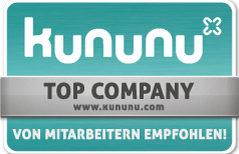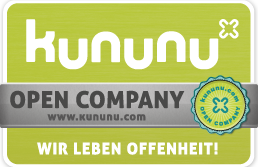7 questions for...
1. talyo. entered the housing market in 2021. What is important when setting up a new housing company?
Martin Henke: For a young company and start-up, the approach is crucial. From the outset, our aim was to act as an established property manager for residential property throughout Germany. It’s not very productive to call all existing structures into question – this is unlikely to be accepted in the industry. Although we are young, we are old in terms of experience. Tattersall-Lorenz’s many years of expertise gave us a solid start. Nevertheless, we have rebuilt talyo. from scratch. We asked ourselves the question: What does a property manager look like which is not only equipped for 2021, but also for the future?
2. And digitalisation certainly plays a major role here. What significance does it have in the real estate industry?
Henke: Digitalisation is of great importance in all sectors, but especially in the housing market, where we are dealing with mass business. Our employees manage 500 to 800 residential properties at any one time. Faced with daily calls from several hundred tenants, it is simply impossible to work efficiently without digital, workflow-based work processes. We have been actively implementing digitalisation since the beginning. First we did away with paper, then automation followed – this is the only way to successfully overcome challenges such as the shortage of skilled workers in the real estate industry.
For us, workflow-based operation takes centre stage. We are constantly working to improve this further in order to fulfil our high quality standards. Of course, not everything can be digitalised. Personal contact should not be neglected, especially for older tenants who appreciate having a contact person who can be reached by phone. Digitalisation is an extremely relevant topic, but it is important to tackle it step by step and take people with us on this journey.
3. How have you implemented digitalisation in your company and how important is a strong partner in this process?
Henke: We received enquiries from many digitalisation companies and IT service providers at an early stage. Thanks to our experience with ERP systems, we were able to make a good judgement as to which system was suitable for us. We were looking for a partner with development potential. To this end, we analysed not only customer and partner lists, but also the companies’ system bases and their investments in development. How is the development team organised and how innovative are they? These were crucial questions for us.
Based on these criteria, PROMOS was ultimately chosen, as the consultancy firm already had major customers with corresponding budgets for innovative solutions. As a new customer, we benefit from this because we can buy these solutions “off the shelf” without incurring high development costs. We immediately opted for a modern, comprehensive ERP system. Although we started small, we were already thinking about the big future. In view of our growth potential and the management of more and more residential units, it was important for us to rely on a future-proof system from the outset that will still be modern and supportable in thirty years’ time.
4. Think big, even if you start small – would you give this advice to other company founders and employees of start-ups?
Henke: Yes, definitely. It’s important to have a clear objective right from the start. However, it must also be realistic, as this is the only way it can lead to success. Recipes for success from the past can help here – how have others done it? What already exists should not only be taken into account, but also valued. You also need to know your customers inside out, as each customer has different wishes and requirements. Private customers, for example, have completely different requirements than the institutional market.
5. Digital is the keyword – the SAP® system was introduced in collaboration with PROMOS in a record time of just three months. What was your recipe for success?
Henke: A structured approach, the use of specialised consultants with in-depth knowledge of the respective modules and constructive communication between the specialist departments were decisive for the rapid and successful implementation on the part of PROMOS. On our side, we have well-trained specialists who have dealt intensively with the subject. We first had to create the necessary capacity for this, as it could not be integrated into our regular workflow. It was therefore important that it was carried out autonomously – this enabled the implementation team to plan, implement and monitor the necessary steps independently. Last but not least, a key factor was the budget, which we were able to set realistically.
Bright Minds, Clear Insights
6. What advice would you give to other companies that are also facing an ERP migration project?
Henke: Sufficient resources must first be available. In addition, all company members should be involved – especially the management and the shareholder base. It’s important that everyone is prepared for the unexpected. The reorganisation must not only be communicated transparently internally, but also externally. Customers should know and understand the planning process.
A reliable partner at your side is an enormous help here, as they not only provide support but also training. Training is crucial! Thanks to PROMOS, we were able to organise this flexibly – the meetings took place digitally in small groups and were adapted to our time constraints and needs.
The right choice of partner is extremely important in a migration project. Reliability is crucial – there should be fixed contact persons who do not constantly change. Mutual understanding and clear objectives that all parties work towards are essential, especially under time pressure. Flexibility also plays a major role. It was particularly beneficial for us that the PROMOS consultants were always available. Thanks to their digital way of working, we were able to make an appointment spontaneously even at 6 p.m. in the evening.
7. Finally, let’s take a look into the future. Are there any exciting projects or developments that talyo. can look forward to in the coming months?
Henke: Yes, we have a lot planned. We will continue to develop our ERP system. There are also plans to introduce various workflows such as an invoice receipt workflow and a digital rental process. Our programme also includes exciting topics such as input and output management. We would like to introduce a legal safety regulations solution that integrates all technical building systems requiring maintenance and inspection as well as our external partners. In the tenant app area, we are currently integrating a chatbot and artificial intelligence to further improve communication with our tenants and at the same time reduce the workload on our employees.
Our main concern is to closely monitor and continuously optimise existing systems and processes. We scrutinise our processes and constantly strive for improvement. Efficiency plays a major role here. How can we make things easier for our employees? Which processes can we optimise so that they have even more time for demanding and important tasks? Our aim is to maintain our high standards so that we can offer our employees, customers and tenants continuous added value.
That sounds great – thank you very much!
redaktion@openpromos.de
7 question for...
is dedicated to digital innovations in the real estate industry. How well placed are companies? Which measures are they focusing on? Experts and industry insiders answer questions in brief interviews.
Part 8:
Martin Henke, Managing Director of talyo. Property Services GmbH

